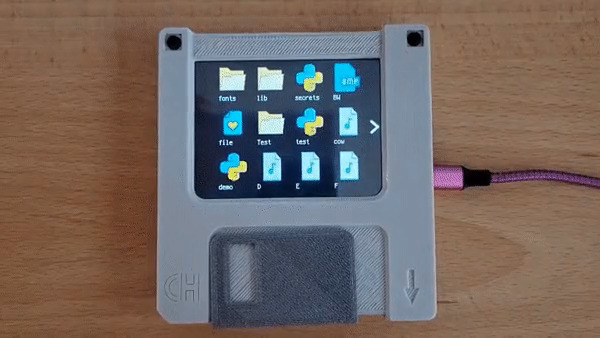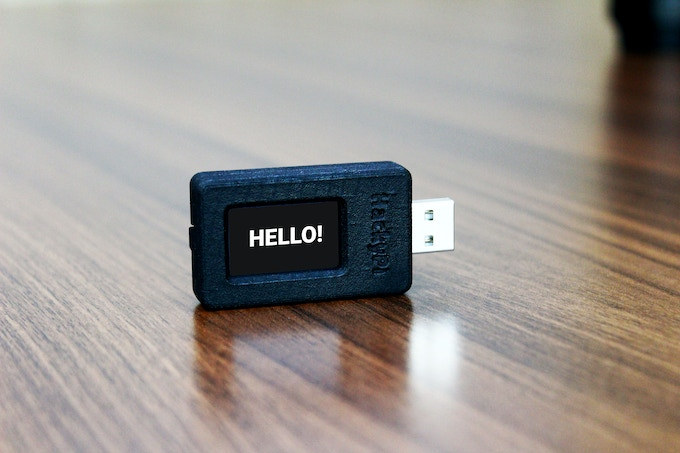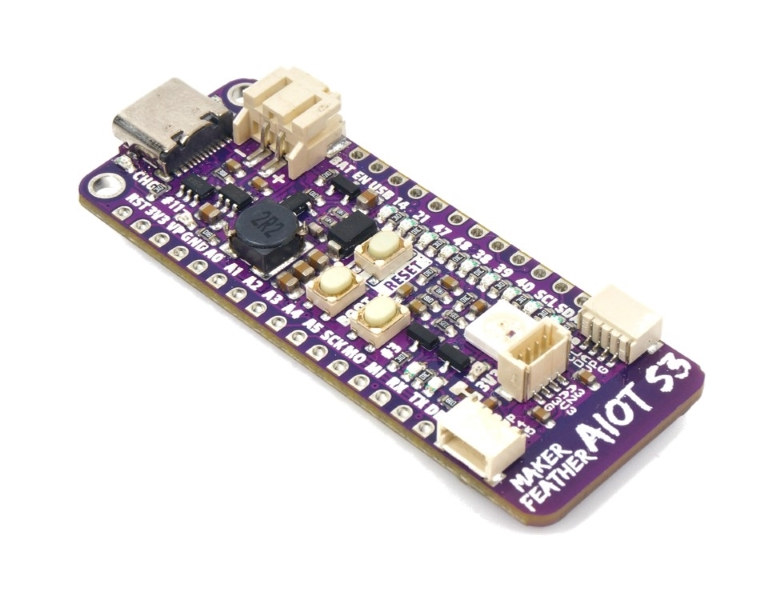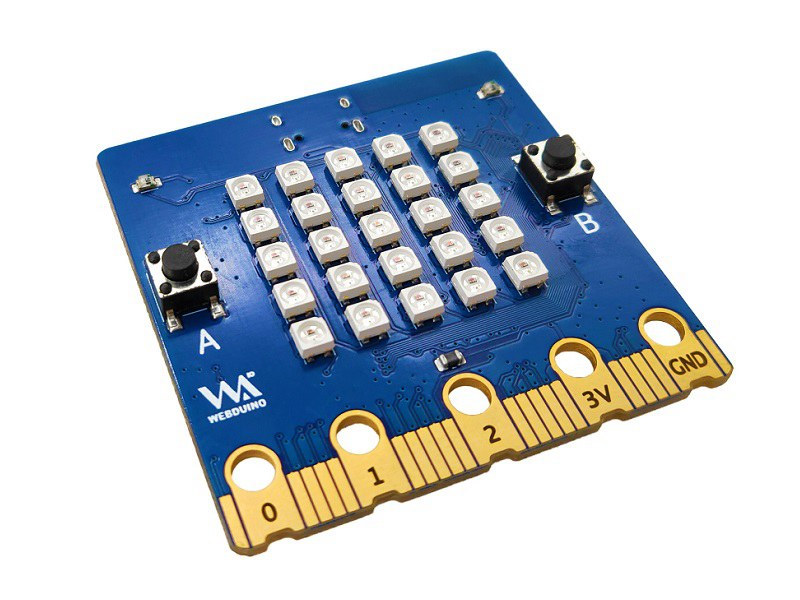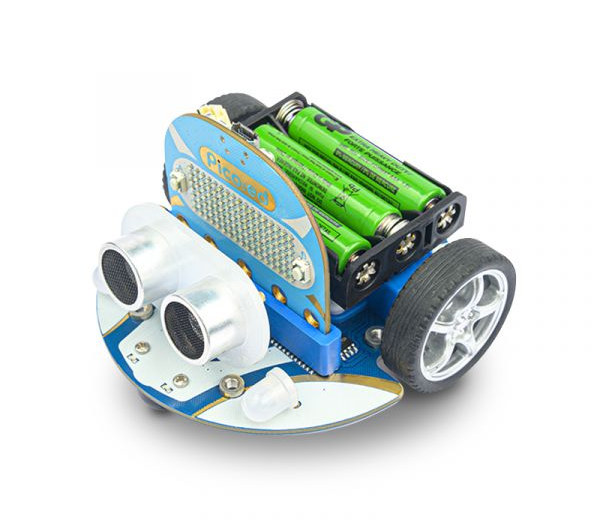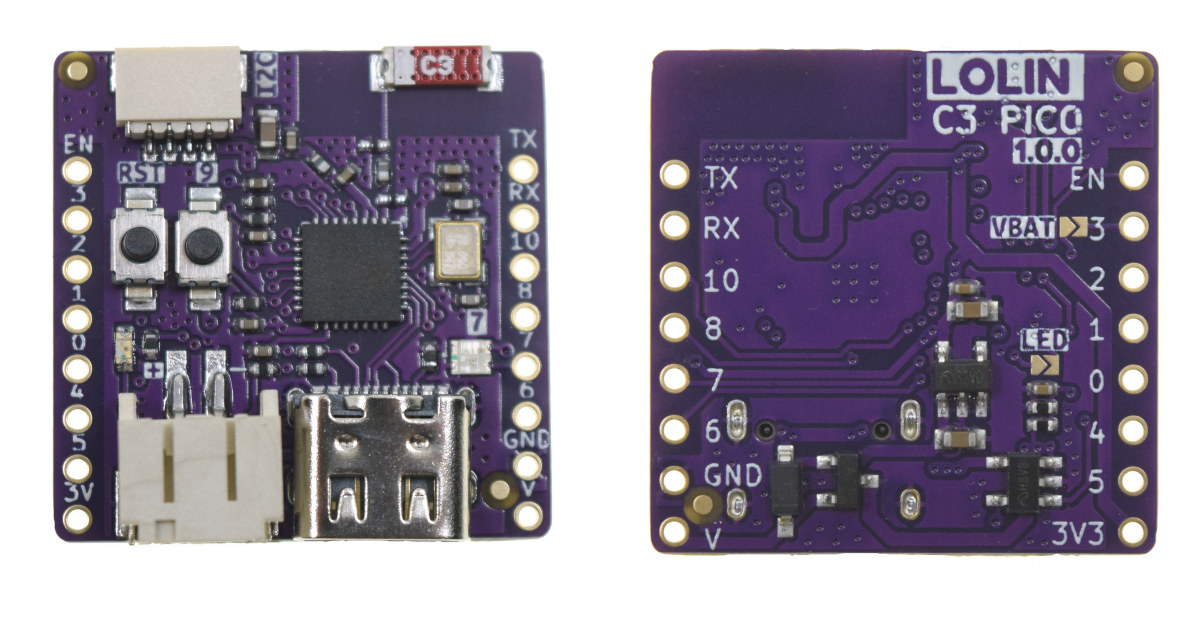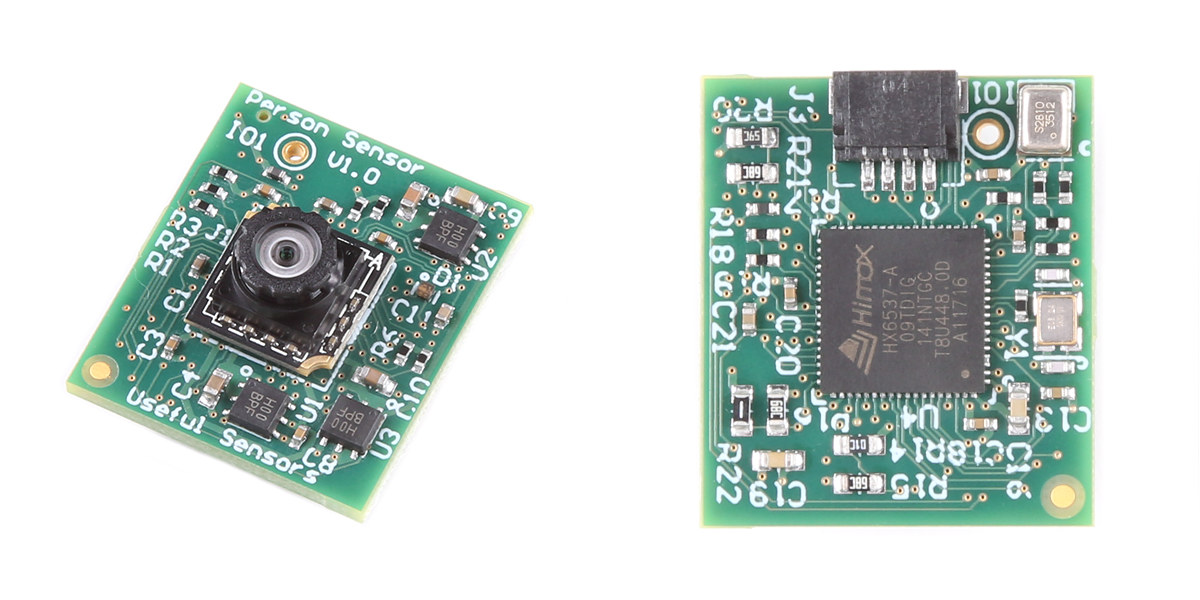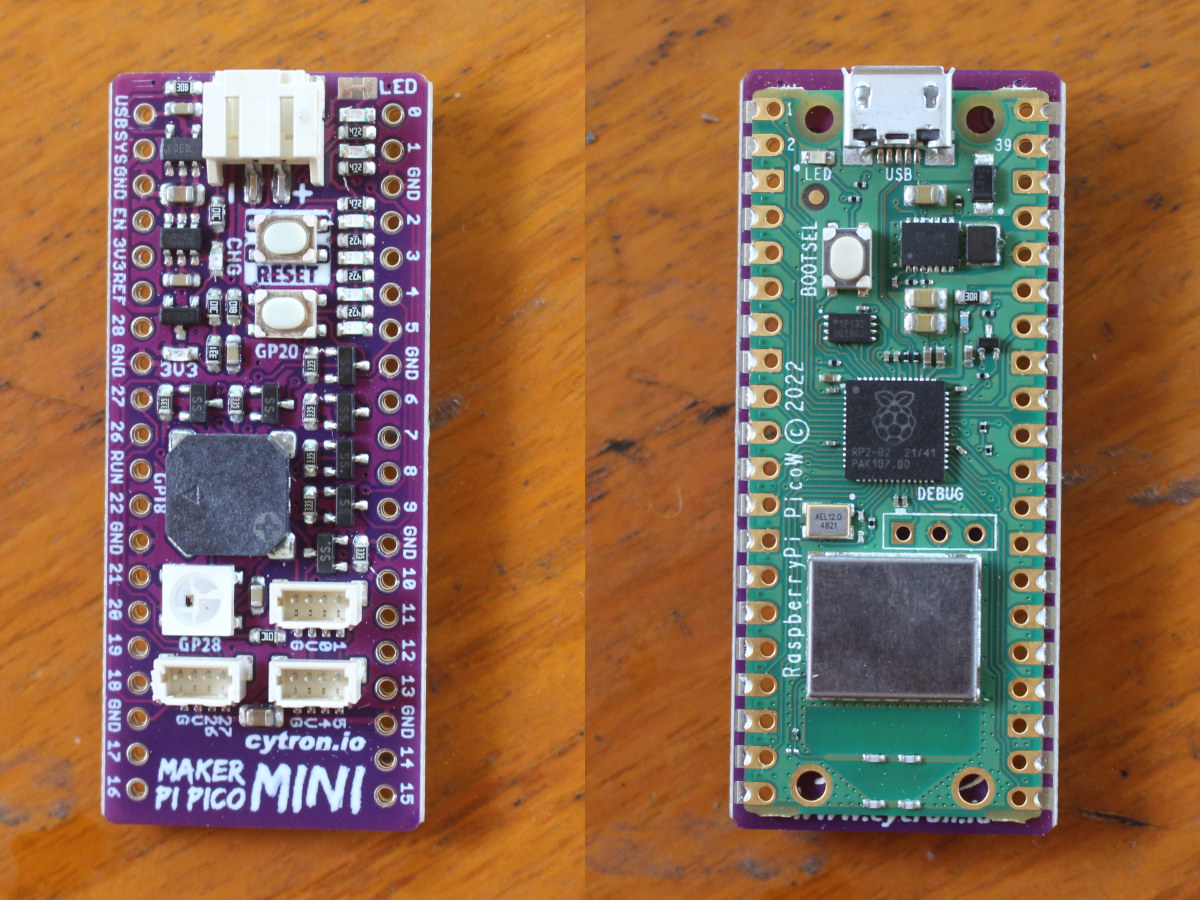Anne Barela’s Floppy Thumb Drive project houses the Adafruit PyPortal internet display in a 3D-printed enclosure that looks like a 3.5-inch floppy disk, just a bit thicker. The computer-in-a-floppy-disk project runs CircuitPython code to list the first 12 files stored in the flash and can display photos or animations, play audio, or execute scripts. The project consists of three main parts: The Adafruit PyPortal internet display with Microchip SAMD51 (ATSAMD51J20) Arm Cortex-M4F microcontroller @ up to 120 MHz with 1 MB flash, 256 KB SRAM Display – 3.2-inch 320 x 240 color TFT display with resistive touchscreen Audio – Speaker Storage 8MB flash storage optional microSD card (not used in the project). ESP32 for WiFi and Bluetooth connectivity (not used in the project) Sensors – Light and Temperature sensors Misc – NeoPixel RGB Micro USB to USB cable 3D printed files for the front cover, back door, front door, disk, […]
HackyPi Raspberry Pi RP2040 USB dongle serves as an educational “hacking” tool (Crowdfunding)
SB Components’ HackyPi is a Raspberry Pi RP2040-based USB dongle whose main purpose is to teach ethical hacking and coding programs, in other words, some sort of portable educational hacking tool. The small USB stick features a 1.14-inch color LCD, a MicroSD card to store data such as scripts and photos, and a button to enable programming like on other Raspberry Pi RP2040 boards. HackyPi specifications: MCU – Raspberry Pi RP2040 dual-core Cortex-M0+ microcontroller @ 133 MHz with 264KB SRAM Storage – QSPI flash, MicroSD card slot Display – 1.14-inch color LCD with 240 x 135 resolution USB – 1x USB 1.1 Type-A port Misc – Boot “Initiate Program” button Power Supply – 5V via USB port Dimensions – 55.04 x 23.20mm SB Components says the HackyPi USB dongle can be programmed with Raspberry Pi Pico C/C++ and MicroPython SDKs as well as CircuitPython, and they will release hardware design […]
Maker Feather AIoT S3 – An ESP32-S3 board programmable with CircuitPython or Arduino
Cytron Maker Feather AIoT S3 is an ESP32-S3 board compatible with the Adafruit Feather form factor and suitable for makers and STEM education with features like LEDs for GPIOs, a buzzer, expansion headers and connectors, and support for CircuitPython & Arduino. The WiFi and Bluetooth LE IoT board also supports LiPo and Li-Ion batteries, includes a USB Type-C port for power/charging and programming, and a few buttons. It’s suitable for machine learning thanks to the vector extensions found in the ESP32-S3 microcontroller. Maker Feather AIoT S3 specifications: Wireless module – Espressif ESP32-S3-WROOM-1-N8R8 module with ESP32-S3 dual-core LX7 microprocessor @ up to 240 MHz with Vector extension for machine learning, 8MB FLASH, 8MB PSRAM, WiFi 4 and Bluetooth 5 LE/Mesh USB – 1x USB Type-C port power and programming Expansion 2x GPIO headers compatible with Adafruit Feather form factor and FeatherWing add-on boards 3x Maker Ports compatible with Qwiic, STEMMA QT, […]
Banana BPI-Bit-S2 BBC Micro:bit compatible board supports WiFi
Banana BPI-Bit-S2 is a board for the education market that’s compatible with the BBC Micro:bit V2, but offers WiFi connectivity instead of Bluetooth LE through an Espressif Systems ESP32-S2 wireless microcontroller. The BPI-Bit-S2 succeeds the earlier Banana Pi BPI-Bit with ESP32 WiFi & BLE microcontroller that was a closer match to the original BBC Micro:bit than the new ESP32-S2 board for which I see little benefit, except for the slightly lower price tag. Banana BPI-Bit-S2 specifications: Wireless MCU – Espressif Systems ESP32-S2FN4R2 single core LX7 microcontroller with 320 kB SRAM, 2MB PSRAM, 4MB flash, 2.4 GHz WiFi connectivity LEDs – 25x RGB LED matrix USB – 1x USB Type-C port for power and programming Sensors – 2x light sensors, 1x thermistor sensor Expansion – 3x I/O rings, 3V/GND rings, 20-pin edge connector (compatible with BBC Micro:bit V2 design) with up to 16x GPIO, I2C, SPI, 3.3V, and GND Misc – […]
Giveaway Week 2022 – Pico:ed Smart Cutebot Kit
The third prize of this year’s giveaway week comes courtesy of ELECFREAKS which offers a Cutebot Pico:ed kit based on the Pico:ed board with a Raspberry Pi RP2040 microcontroller and following BBC Micro:bit form factor. The kit also includes two high-speed motors to drive two wheels, ultrasonic & distance sensors, two RGB LED lights and clearance lamps on the bottom, two line-tracking probes, and an active buzzer used as a horn. It is powered by three AAA batteries. The company initially me asked me if I wanted to review the board/robot, but since I may not have the time to do so, I asked whether they wanted to be included in our yearly giveaway week which they accepted. The company provides instructions to program the robot with “Micro block” visual programming IDE, C++, and CircuitPython. You’ll find resources to get started and eight projects for the robot in the Wiki. […]
LOLIN C3 Pico is a tiny ESP32-C3 board with battery charging support
LOLIN C3 Pico is a tiny (25.4×25.4mm) ESP32-C3 RISC-V board with 2.4 GHz WiFi and Bluetooth Low Energy connectivity, a few I/Os, and LiPo battery support including charging circuitry. I tend to like Wemos/LOLIN boards, because of their small form factor, support for equally tiny shields, and low price. The LOLIN C3 Pico is no exception, and even adds a few features such as an RGB LED, an I2C connector, and support for battery power and charging. LOLIN C3 Pico specifications: SoC – Espressif Systems ESP32-C3FH4 single-core 32-bit RISC-V (RV32IMC) microcontroller up to 160 MHz with 400 KB SRAM, 4MB Flash Connectivity – 2.4 GHz WiFi 4 and Bluetooth 5.0 LE (in SoC) Expansion headers 2x 8-pin headers with up to 12x GPIO, ADC, I2C, SPI, UART (3.3V I/O voltage) LOLIN I2C port USB – 1x Type-C USB for 5V power and programming Misc – Reset button and user button, […]
Easily add face detection to your project with the Person Sensor module
It’s now much easier to AI features to your project thanks to better tools, but as we’ve experienced when trying out Edge Impulse machine learning platform on the XIAO BLE Sense board, it still requires some effort and the learning curve may be higher than some expect. But for common tasks like face detection, there’s no reason for the solution to be hard-to-use or expensive, and Pete Warden (Useful Sensors) has designed the $10 Person Sensor fitted with a camera module pre-programmed with algorithms that detect nearby faces and reports the results over an I2C interface. Person Sensor specifications: ASIC – Himax HX6537-A ultra-low-power AI accelerator @ 400 MHz with 2MB SRAM, 2MB flash Camera Image Sensor – 110 degrees FOV Image scan rate – 7Hz with no facial recognition Image scan rate – 5Hz with facial recognition active Host interface Qwiic connector for the I2C interface up to […]
Maker Pi Pico Mini adds battery, buzzer, GPIO LEDs to Raspberry Pi Pico (W)
Cytron’s Maker Pi Pico Mini is an add-on board for the Raspberry Pi Pico and the latest Raspberry Pi Pico W with a battery port, GPIO status LEDs, a WS2812B Neopixel RGB LED, passive piezo buzzer, user and reset button, as well as “Maker” ports for expansion. It comes with most of the features found in the company’s Maker Pi Pico board, but in a much more compact form factor, since the add-on board is only slightly larger than the Raspberry Pi Pico to allow for soldering using the castellated holes. Maker Pi Pico Mini specifications: Fitted with Raspberry Pi Pico / Pico W LEDs – 6x Status indicator LEDs for GPIOs, 1x RGB LED (WS2812B Neopixel) Audio – 1x Passive piezo buzzer (to play musical tones or melody) Buttons – Reset and user buttons Expansion 3x Maker ports compatible with Qwiic and STEMMA QT, as well as Grove modules […]


